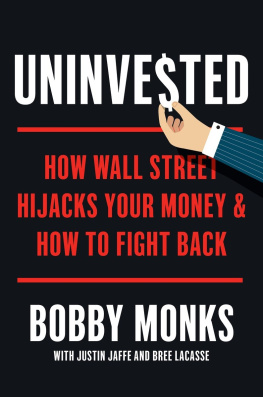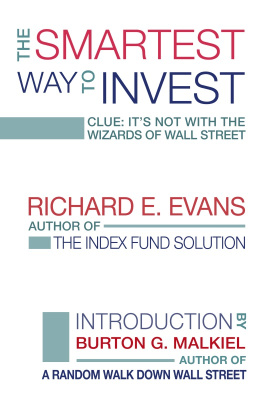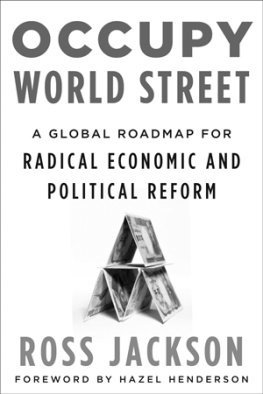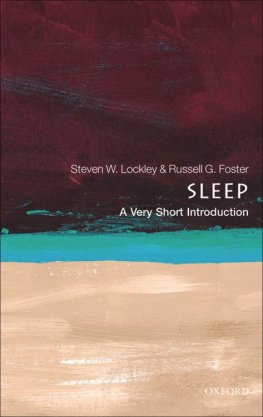Copyright 2015 by Robert C. S. Monks
Penguin supports copyright. Copyright fuels creativity, encourages diverse voices, promotes free speech, and creates a vibrant culture. Thank you for buying an authorized edition of this book and for complying with copyright laws by not reproducing, scanning, or distributing any part of it in any form without permission. You are supporting writers and allowing Penguin to continue to publish books for every reader.
While the author has made every effort to provide accurate telephone numbers, Internet addresses, and other contact information at the time of publication, neither the publisher nor the author assumes any responsibility for errors or for changes that occur after publication. Further, the publisher does not have any control over and does not assume any responsibility for author or third-party Web sites or their content.
This publication is designed to provide accurate and authoritative information in regard to the subject matter covered. It is sold with the understanding that the publisher is not engaged in rendering legal, accounting, or other professional services. If you require legal advice or other expert assistance, you should seek the services of a competent professional.
Sleepwalking, contrary to most belief, apparently has little to do with dreaming. In fact, it occurs when the sleeper is enjoying his most oblivious, deepest sleep...
Preface
I.
We, the investors, have fallen asleep.
Sure, we occasionally wake up to glance at our portfolios. We look at our zigging and zagging account balances. We fileor, more likely, recycleour monthly statements. Our investments grow or wither.
But theres really nothing for us to do about it. So, back to sleep.
Sometimes our sleep is disrupted by uneasy dreams or nagging doubts. How exactly does this whole investment system work? Why did we buy that mutual fund? What caused our account balance to go up or down? What happens to the money we invest?
We toss and turn, uncertain of who is managing our money. We hope our financial adviser is the omniscient captain, expertly navigating ever-shifting market currents. But perhaps our portfolios are simply bobbing along the surface of the Dow Jones Industrial Average, ascending when the tide rises and sinking as it retreats.
On occasion, we are gripped by nightmares. We fear our own money has been turned against us, invested in companies we deplore. We worry that our capital has made us complicit, endowing the perpetrators of environmental ruin, financial apocalypse, and political dysfunction.
There is just so much we dont know as we sleep.
We are only one generation removed from a financial world that was far simpler, more transparent, and less risky than the one we live in now. But the landscape for investors continues to evolve into one thats more complex, opaque, and speculative. And we grow ever more dependent on financial instruments that are a mystery to us and on money managers whose incentives are obscure.
We lie with our eyes closed now, deep in our reverie, but with a dawning awareness that the sheep we are counting are being fleeced. And that they are us.
II.
Financial firms and money managers have intentionally made investing overly complicated and then convinced us that we cannot do it on our own. They have elbowed their way into every corner of investing, cultivating a financial intermediary complex that disconnects us from our capital and charges us handsomely for it.
Money managers control trillions of investors dollars, which makes them highly influential in social, environmental, financial, and political matters. As we have seen after two scandal-driven recessions, their strategy has been to leverage this influence primarily to advance their own interests.
Having interacted with the financial sector throughout nearly every phase of my career, I was not surprised to learn of the ethically dubious activity that led to the most recent economic downturn in 2008. Though many well-intentioned financial advisers and money managers serve their clients with integrity, unscrupulous activity has long been pervasive in this industry, though it has been due to systemic deficiencies as much as the behavior of bad actors. What did surprise me, however, was the passivity of investors.
Even in the decades preceding the most recent downturn, very few investors enjoyed financial success equal to that of their money managers. Given this, I have long wondered why investors dont pull their money out of the system en masse.
I suspect that it is because most feel powerless. Unaware of the implications of their investments and unable to penetrate the excruciating complexity of the system that facilitates them, many seek refuge in their money managers aura of sophistication, pretense of competence, and projection of certainty. It seems to me that most investors are simply sleepwalking through the investing process.
They have become uninvested.
III.
Discomfited by the increasing dysfunction Ive observed in the financial sector over the past thirty years, I decided to help investors break out of this unhappy dream state and reinvest in themselves as owners. As a serial entrepreneur whose ventures have included building, buying, and running companies involved in banking and investment services as well as real estate development, media, and technology, I figured I could offer insights from my experience working in and around the financial sectorboth as executive and customer, investor and creditor, and almost always as an active, awake, and engaged participant.
I started my career by developing real estate projects, which gave me my first taste of dealing with banks and investors as well as an array of state and government regulators.
Later, I was a cofounder and served as chairman of the executive committee of Atlantic Bank and Trust. I oversaw activities ranging from capital formation to derivatives to government regulation, and observed firsthand the importance of communication, trust, and transparency in managing other peoples money.
I was the chairman of Institutional Shareholder Services and of Proxy Monitor, the two largest global proxy voting services. I worked on the front lines of corporate governance issues, including disclosure and executive compensation, and witnessed the power of organized shareholders in enforcing accountability in corporations.
I am an owner of Mediant Communications, which facilitates shareholder communication. This position has enhanced my understanding of the complexity of corporate disclosure and the inherent challenges in giving investors accurate, timely, comprehensible information.
Until recently, I was chairman of Spinnaker Trust, a company that has more than $1 billion under management. This gave me a ringside view of the inadequacies of modern money management. I am also an owner and director of iiWisdom, a startup dedicated to improving communication between institutional investors and their portfolio companies in order to increase accountability.
In 2010, I began to study the financial sector more formally, paying particular attention to the relationship between investors and money managers. I partnered with two researchers, Bree LaCasse and Justin Jaffe, to investigate the mechanics of this sector and its unique role in the economy, hoping to figure out how to counteract its unsustainable trajectory.














